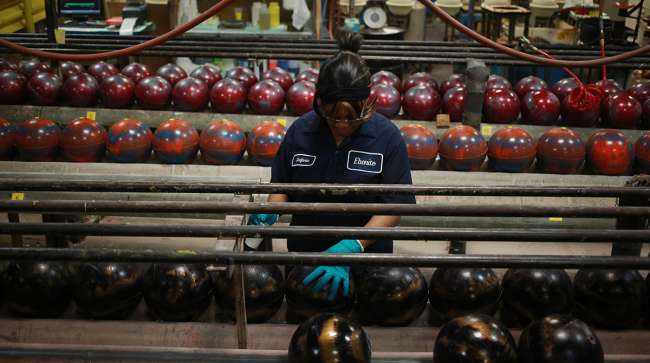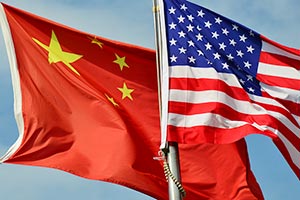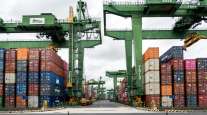US Factories Brace for Sting of 2019 Trade War

America’s manufacturers are scrambling to change the way they do business — from finding new suppliers to shifting more finishing work overseas — as the sting of tariffs begins to take a bigger toll on their bottom lines.
A range of recent reports have underscored fault lines in what had been a growing part of the economy. They all point to waning optimism because of a tight labor market, uncertainty over the stock market, rising interest rates — and especially trade issues.
Ben Bidwell, director of U.S. customs at C.H. Robinson, said clients have been swarming to the Eden Prairie, Minn.-based logistics giant for help. They are hiring trade attorneys, renegotiating with custom brokers and hiring consultants in record numbers to mitigate the damage of trade tariffs.
“Collectively, our customs and trade policy group have never been busier than they are today,” Bidwell said. “They are inundated with calls from clients (seeking help) with tariff classification processes and looking at things like alternative importing sources, foreign trade zone options and import duty drawbacks. All those things are happening at such large numbers — and, yes, this is certainly costing importers money.”

Both the export and import measures in Creighton University’s nine-state Mid-America Business Conditions Index have been showing slower growth in recent months and actually fell in December for the first time in years. That was directly attributable to the tariff issues, said Ernie Goss, director of Creighton University Economic Forecasting Group.
The Institute for Supply Management found similar results for December, with imports across the United States slowing to levels not seen since May 2017.
The Dallas Federal Reserve’s factory index unexpectedly contracted this month, falling to a two-year low and showing the steepest decline since 2013, Bloomberg reported. The report follows other weakening Fed factory gauges in the New York, Philadelphia, Richmond and Kansas City districts, just the sixth time that’s happened during the economic expansion that is now in its 10th year, a Bloomberg analysis of Fed data showed.
Moody’s this month downgraded its outlook for the global manufacturing industry due to “trade tensions” that it said are expected to negatively impact product demand and profits in 2019.
Economists have been warning of more disruption for months. President Donald Trump leveled his administration’s first tariffs against Chinese steel and aluminum imports in March 2018 and followed with levies on products from Europe, Mexico and Canada.

Getty Images
Soon retaliatory tariffs followed, and the United States has been negotiating with countries ever since.
For months, factory heads said they scrambled behind the scenes to contain the fallout, without dumping overseas suppliers and trying to keep international customers.
While many Minnesota manufacturers were able to keep stability in 2018, they are worried about global logistics for this year, said Gabrielle Gerbaud, executive director of the Minnesota Trade Office.
“If you look at the import of industrial parts, most of our manufacturers had a stockpile of parts so they could function at their old (costs) before their inventory wore down,” Gerbaud said. Now the cushion is gone.
For Minnesota’s trade office, it’s the small and medium-sized manufacturers that are most at risk, though, Gerbaud said. They don’t have the order volumes to request tariff waivers from the U.S. government.
“They are not big or strong enough and they are always the ones who are affected by instability,” she said. “This unstable environment is hurting them.”
The implications could be substantial. Minnesota companies import and export $50 billion worth of goods each year, she said.

Craig Warga/Bloomberg News
Packaging equipment maker Delkor Systems, based in Arden Hills, said it faced declining orders from Canada and Mexico as those countries were caught in the trade skirmishes. Now Delkor and other companies are waiting for NAFTA’s replacement to be approved by Congress.
Monticello, Minn.-based precision machine shop Ultra Machining Co. simply “ate the extra costs” when the aluminum metal it imported to make medical devices faced U.S. tariffs last summer, said Ultra Machining President Eric Gibson. He faced bills several thousand dollars higher that he had not anticipated in the 2018 budget.
Plymouth, Minn.-based Banner Engineering, which makes industrial sensors with supplies purchased from 12 countries, saw its component costs from overseas suppliers jump by double-digit percentages.
“Banner is directly affected by the tariff situation going on right now,” said Andy Barnauskas, the company’s vice president of operations.
Banner is now trying to find new trading partners, possibly in different countries, and in the meantime has passed some of the costs on to customers.
The trade tensions prompted many of accounting firm Baker Tilly’s 4,500 midsize manufacturing clients to switch gears. Instead of searching for ways to sell more products overseas, clients now want help mitigating trade tariffs, said Brian Simpson, an international growth specialist for Baker Tilly.
Many are rerouting component parts that previously shipped from China into the United States. Those parts are now sent from China to the clients’ other plants in Europe or Canada. There, components are altered, embedded into larger systems and then shipped into the United States.
“Right now, the ones who are doing this are not being public about it,” Simpson said. “But what they are doing is legal and is vetted by law firms. We have had dozens of companies come to us in the last 90 days about this. Companies that have large exposures are investing in ways to mitigate their risk. They are not waiting because there are millions of dollars on the line.”
The industrial robotics maker PaR Systems in Shoreview, Minn. — which sources steel and high-tech parts from around the globe — is considering switching from Canadian to U.S. suppliers. It is also redesigning some robotic products so they use less steel.
“We are trying to source as effectively as we can and to mitigate the price impact from tariffs,” said PaR spokesman Ray Goodwin.
Behemoths such as 3M Co. in Maplewood, Minn. and industrial sprayer manufacturer Graco in Minneapolis have boosted their product prices to compensate for the extra trade levies.
Other large companies, such as Medina, Minn.-based Polaris Industries and Milwaukee-based Harley Davidson, moved some U.S. vehicle and parts production overseas to Poland, India or Thailand to avoid retaliatory trade tariffs by U.S. trading partners. Yet others are selling more of their products made overseas to other countries.
For Banner Engineering, it also means shifting work to its international operations, said Barnauskas, the operations head. “Before we would (import) and consolidate everything in the United States and then mail it out,” he said. Now, products are put together overseas.”
Distributed by Tribune Content Agency, LLC




